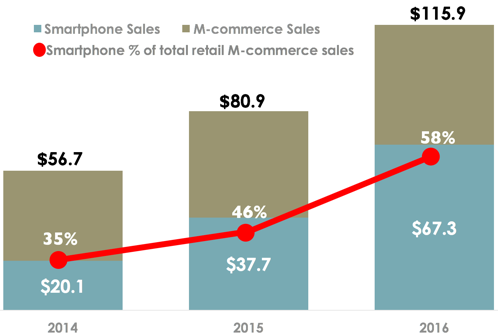Why 2021 Is Your Mobile Strategy Doomsday


Change with the times, or the times will change you. These words have never been more true than they are today. That’s because mobile devices, especially smartphones, are changing the game for retailers. Mobile is more than just the way emails render. Mobile is the primary way people consume information. Consider this:
- eMarketer found that since 2013, mobile devices have gained more than one hour in major media consumption time, up to 3:17, while TV has declined to 4:01.
- According to Fluent, the smartphone is the primary device (55%) used to access the internet, while only 26% prefer a laptop or desktop.
What does this all mean for commerce marketers? Has this trend toward mobile been overstated? How quickly are things changing? Let’s take a look at what the industry has been seeing and how you can prepare for what’s coming our way.
The Growth of Online Sales
Year over year, ecommerce is not only growing but taking an increased percentage of total retail sales. According to eMarketer, ecommerce sales accounted for $396 billion last year, which was more than 8% of total retail sales. That’s a significant increase from the year before, with ecommerce sales totaling $343 billions and accounting for 7.3% of total retail sales.

When we look at sales from mobile commerce, 2016 clocked in at nearly $116 billion in sales – 29% of total ecommerce sales. In 2015, mobile commerce accounted for nearly $81 billion in sales and 23.6% of total ecommerce sales. Once again, you can see not only strong overall growth, but the increased contribution of mobile to online sales.

When we hear mobile commerce, we immediately think of smartphones – and rightfully so. They continue to be the go-to mobile device for consumers. In 2016, 58% of mobile sales were made on smartphones, up from 46% the year before. Smartphone purchasing is rapidly increasing year over year. This can’t be ignored.

What's Next?
It’s time to get serious about mobile. It’s predicted that by 2021, mcommerce will make up more than 50% of total ecommerce sales. While it’s important today to optimize for mobile, not being fully optimized in only a few short years will officially leave you behind the times.

Be prepared. Take time to analyze where you might need improvement. Here are a few things to think about:
- Are your checkout pages optimized for mobile? Are they integrated with mobile payment solutions, such as ApplePay? The days of filling out long forms on mobile devices, manually moving from one box to the next, are on their way out.
- Is your website completely mobile-friendly, from search to checkout?
- Are your emails designed for mobile?
- Are your communications relevant? If emails, recommendations and search results are not relevant, consumers will simply move on.
According to Statistica, an average mobile user checks their phones 150 times each day. They can do whatever they want, wherever they want, whenever they want. They can find any product they are looking for, regardless of where in the world it’s located. If you don’t provide a frictionless, relevant, up-to-date user experience, someone else will.
This content was originally published by Oracle + Bronto.
Want more like this?
Want more like this?
Insight delivered to your inbox
Keep up to date with our free email. Hand picked whitepapers and posts from our blog, as well as exclusive videos and webinar invitations keep our Users one step ahead.
By clicking 'SIGN UP', you agree to our Terms of Use and Privacy Policy


By clicking 'SIGN UP', you agree to our Terms of Use and Privacy Policy
Other content you may be interested in

Want more like this?


Want more like this?
Insight delivered to your inbox
Keep up to date with our free email. Hand picked whitepapers and posts from our blog, as well as exclusive videos and webinar invitations keep our Users one step ahead.
By clicking 'SIGN UP', you agree to our Terms of Use and Privacy Policy









